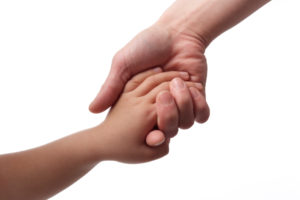 My youngest daughter’s first words were “No waaay!”
My youngest daughter’s first words were “No waaay!”
Adorable.
Impossible not to laugh and smile and giggle and eat her every time she said it.
Incredibly frustrating when I just want her to lie down or stop throwing her food on the floor.
When I just want her to listen to me and do what I asked.
The ways we teach and encourage our children to listen to us changes as they get older, and what we say and do when they are less than a year old is very different when they are school age and can argue and negotiate and impart their own reasoning and logic into a conversation you never really intended to have.
Sometimes “put on your shoes now” is just “put on your shoes now.” Not soon. Not when the video is over. Not if you buy them a treat while you’re out. Not if they’re going to lose iPad privileges if they don’t.
We all want to teach our children to advocate for themselves, to be strong thinkers and articulate speakers (except when they use these important skills against us…), and while we are ultimately looking for obedience, the word chafes a bit on our parenting sensitivities. We’re not looking for a power struggle. We want them to respect our role as their teachers and guides in life and trust that what we ask from them is in their best interests and in the best interests of the family.
And like Nike says, just do it!
This week’s parashah – Be-Khukotai – is the last in the book of Va-Yikra (Leviticus). The opening verse states:
If you follow my statutes and observe my commandments and perform them.
The text goes on to relate all the wonderful blessings we will have if we do – rain when we need it, plentiful food and security in our land. However, if we do not comply with the God’s covenant, we will endure persecutions and exile and many other horrible consequences.
Many existential and theological questions arise from the covenantal relationship detailed here. Why are the consequences all based in nature and this world? Where are the spiritual benefits and condemnations for following God’s commandments? Are the blessings and afflictions reward and punishment or are they the natural consequences to human interaction with the planet?
We all know that terrible, tragic things happen to good people, and that many less-moral people seem to be living with much “fortune.” Understanding the text as evidence of a tit-for-tat relationship between God and His people seems unlikely, and dismissing the covenantal relationship as irrelevant if lightening does not strike when you drive on Shabbat or eat a cheeseburger is also too simplistic and facile.
A covenant is a fancy word for contract and in any contract there is mutual responsibility. Each party has items they must fulfill in order to achieve the desired outcome. God’s covenant with His people is with His people as a whole – not with each individual in this group – and while each person has certain responsibilities, ultimately we are performing and fulfilling them for the benefit of the community or people as a whole and not for our own personal gain.
Like our children, when we are expected to be blindly obedient, our thoughts and opinions and individuality feel stifled. But when we understand that the Torah is asking us to participate in a process that is greater than our own needs and that our actions have repercussions beyond our own relationships, we accept responsibility rather than submit to a list of dos and don’ts.
Lord Rabbi Jonathan Sacks defines leadership as the acceptance of responsibility. If each and every one of us is responsible for each other, then we are each a leader within our own sphere of influence. And when we accept responsibility for what we can contribute to our community’s covenant with God, we guide others to do their part as well.
It’s not a new revelation, complicated or esoteric – if we all work together for a Truth greater than ourselves – like kindness to people, animals or the planet and to what extent we follow a set of moral guidelines – the world will be a better place.
Our goal should be to instill that language and way of thinking in our children. Putting on shoes when you ask or putting all your dishes in the dishwasher after every meal is not about the power of wills and whose need is more important or more immediate. It’s about accepting responsibility for your place in the family, in school, in this world and acting as a leader to those who are watching you – like siblings or friends.
“Because I said so,” is rarely helpful long term, and is palatable to neither child nor adult.
Rabbi Sacks said:
The people who change the world are those who believe that life has a purpose, a direction, a destiny. They know where they want to go and what they want to achieve. In the case of Judaism that purpose is clear: to show what it is to create a small clearing in the desert of humanity where freedom and order coexist, where justice prevails, the weak are cared for and those in need are given help, where we have the humility to attribute our successes to God and our failures to ourselves, where we cherish life as the gift of God and do all we can to make it holy.
Let us show our children how they can change the world.
Shabbat Shalom.












